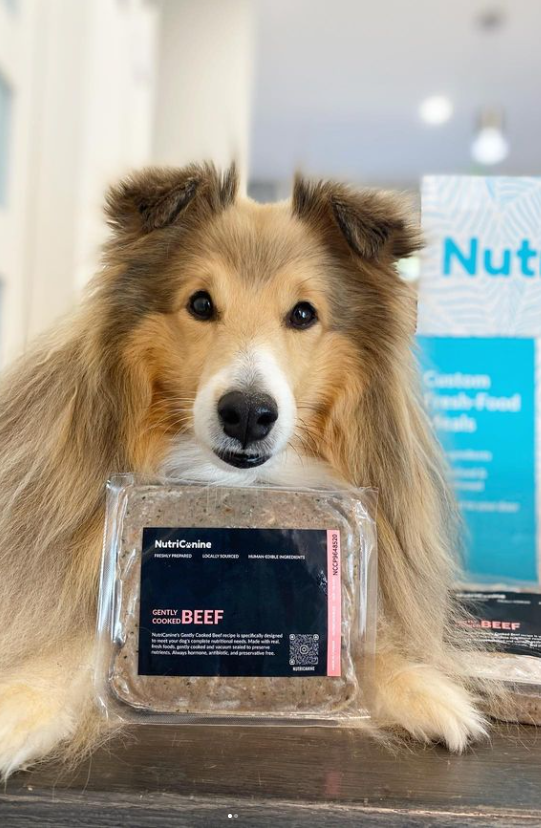“I have three pups, all picky eaters, and they devoured their meals! I’m so happy to have found a quick, easy and super healthy food.”
Quick Stats About the Labrador Retriever

Height 21.5–24.5 inches

Weight 55–80 lbs
Lifespan 10–12 years
Energy level High
Shedding Moderate to heavy
Grooming Low to moderate
Get a custom meal plan designed specifically for your Labrador Retriever
Get StartedLabrador Retriever: Everything You Need to Know


The Labrador Retriever is one of the most popular and beloved dog breeds in Canada—and for good reason. Labs are known for their friendly nature, intelligence, and unmatched loyalty, making them wonderful family companions, service dogs, and outdoor adventure buddies. Originally bred for retrieving game in the water, Labs are athletic dogs with high energy and a strong desire to please. They get along well with kids, other pets, and just about everyone they meet. Their intelligence makes them easy to train, though their boundless enthusiasm means they need plenty of exercise and mental stimulation. Labs also have a tendency to overeat if not properly managed, which can lead to weight gain and joint issues later in life. Understanding their nutritional needs at every stage—from puppyhood through their senior years—is key to keeping them healthy and active. With the right balance of nutrients, Labradors can thrive well into their golden years.
Create the Perfect Meal Plan for Your Labrador RetrieverCharacteristics and Care
Appearance
Labrador Retrievers are well-known for their sturdy, athletic build. With their broad, muscular bodies and “otter” tails, Labs exude strength and agility. Their coats are short and dense, with a water-resistant layer that helps them thrive in a variety of environments. Colors range from black, yellow, and chocolate, and while their coats are low-maintenance, they do shed moderately, especially during seasonal changes. Whether lounging at home or charging through the water, their appearance reflects their dynamic nature and love for active pursuits.
Temperament
The Labrador Retriever is one of the most friendly and sociable breeds, making them excellent companions for families and individuals alike. They are known for their loving, patient nature, and they thrive on human interaction. Labs are typically good with children, other dogs, and even small pets, making them highly adaptable to various household environments. With a natural instinct to please their owners, they are often described as eager to learn and affectionate, which makes them great pets for first-time dog owners or active families.
Grooming
One of the appealing traits of the Labrador Retriever is its relatively low grooming requirements. Their short, dense coat doesn't mat easily, but they do shed year-round, with more intense shedding during seasonal changes. Regular brushing, especially during the shedding seasons, will help control loose hair and maintain the coat’s shine. Labs are also known for their love of water, so if they spend a lot of time in the water, a good rinse and drying are essential to keep their coat clean and healthy. Their ears should also be checked regularly, as Labs can be prone to ear infections due to their floppy ears and love of water. Regular brushing and ear cleaning will keep them looking and feeling their best.
Training & Exercise
Labrador Retrievers are intelligent, eager to please, and highly trainable, which makes them great candidates for obedience training. Early socialization and positive reinforcement will help them grow into well-rounded adults. Because they are active and energetic, they require regular exercise to stay healthy and happy. Daily walks, runs, and play sessions are essential to burn off their energy. Labs love activities like fetch, swimming, and hiking, making them ideal companions for outdoor adventures. Without sufficient exercise, they can become bored and exhibit undesirable behaviors. Exercise not only keeps them physically fit but mentally stimulated, which is just as important for a breed that thrives on challenge and interaction.
What Makes a Labrador Retriever Unique
Labrador Retrievers are one of the most beloved and iconic dog breeds worldwide, known for their versatile nature, loyalty, and friendly disposition. What sets them apart is their remarkable ability to excel in various roles, from service dogs to hunting companions to family pets. Their intelligence and eagerness to please make them highly trainable and adaptable to almost any situation. Labradors are natural swimmers, thanks to their water-resistant coats and webbed feet, which help them thrive in aquatic environments. Their strong work ethic and endurance also make them ideal for active individuals and families. Labrador Retrievers are often seen participating in various activities, such as agility, hunting, therapy, and even search-and-rescue missions. But despite their hardworking nature, they have a gentle, loving side, particularly with children and other pets. In addition to their intelligence, Labs are known for their social nature—they are never happier than when they’re surrounded by family. However, this also means they require ample attention, love, and interaction to stay emotionally healthy. Labs can be prone to certain health issues, such as hip dysplasia and obesity, which can be managed through proper care and nutrition. Their love for food and tendency to overeat means they benefit from a carefully balanced diet that supports their active lifestyle and helps maintain a healthy weight.
Create a Meal Plan That Caters to Your Labrador’s Unique Needs

Health Considerations for Labrador Retrievers
Labrador Retrievers are generally a healthy breed, but like all dogs, they are prone to certain health issues that can affect their quality of life. Understanding these potential concerns and providing the right diet and care can make a significant difference in their long-term health and happiness.
Hip and Elbow Dysplasia
Hip and elbow dysplasia are common joint conditions in Labrador Retrievers, particularly in those with a larger frame. These conditions are caused by abnormal development of the hip or elbow joint, which can lead to arthritis and pain over time. While genetics play a role in dysplasia, maintaining a healthy weight through proper nutrition and exercise can help reduce the risk of joint issues. Labrador puppies should also be carefully monitored for excessive growth, as rapid weight gain can exacerbate joint problems. Regular vet check-ups and joint supplements, like glucosamine, can also provide additional support for their joints. Ensuring your Lab stays active without overexerting themselves can help keep their joints mobile and strong.
Obesity
Labradors have a tendency to overeat, which makes them more prone to obesity if their diet is not carefully managed. Obesity can lead to a variety of health problems, including joint pain, heart disease, and reduced lifespan. Since Labs are highly food-motivated, it’s essential to monitor their calorie intake and provide portion-controlled meals that align with their activity level. Incorporating high-quality protein and fiber into their diet can help them feel full and satisfied without overindulging. Regular exercise is crucial for weight management, but a tailored diet is equally important to prevent unnecessary weight gain. Preventing obesity in Labs can extend their quality of life and reduce the risk of other health complications.
Ear Infections
Due to their floppy ears and love of water, Labrador Retrievers are prone to ear infections. Moisture and bacteria can easily build up in the ear canal, leading to infections that cause discomfort and pain. Regular ear cleaning and ensuring their ears stay dry, especially after swimming or bathing, can help prevent infections. If you notice signs like scratching, shaking of the head, or a foul odor, it’s important to get their ears checked by a vet. Nutritional support, including omega-3 fatty acids, can also promote healthy skin and ear tissues, reducing inflammation. Keeping their ears clean and dry can significantly improve your Lab’s overall health and comfort.
Eye Conditions
Labrador Retrievers can be prone to eye conditions such as cataracts and progressive retinal atrophy (PRA). Cataracts can cloud the lens of the eye, affecting their vision, while PRA leads to the degeneration of the retina. While genetic testing is available for some eye diseases, maintaining overall health through proper nutrition can help support their eye health. Including antioxidants like vitamin E and beta-carotene in their diet can protect the eyes from oxidative damage. Regular veterinary check-ups will help catch any issues early, and any signs of vision loss, like bumping into objects or unusual behavior, should be addressed quickly. A diet rich in nutrients that support vision can contribute to your Lab’s well-being, helping them live a fuller, more active life.


Nutrition for Every Stage and Need
A Labrador Retriever’s nutritional needs evolve throughout their life, from their puppy days to their golden years. Whether they are growing, maintaining weight, or managing specific health concerns, the right diet is essential for their long-term health. At NutriCanine, we offer tailored meal plans designed to support your Lab at every stage of their life, ensuring they get the right nutrients to thrive.

Labrador puppies have unique nutritional needs to support their rapid growth and development. During this crucial stage, they need high-quality, easily digestible protein to build muscle and promote healthy organ function. Essential fatty acids, like omega-3s, support brain development, while calcium and phosphorus help with bone and joint formation. Labrador puppies also require more calories than adult dogs to fuel their energetic play and exploration. To avoid overfeeding and potential joint stress, portion control is important, even for puppies. A balanced diet with the right ratios of protein, fat, and carbohydrates ensures they grow at a healthy, steady pace without gaining excess weight.

As your Labrador matures into adulthood, their nutritional requirements shift. At this stage, it’s important to provide a diet that supports their active lifestyle while maintaining a healthy weight. Adult Labs need a moderate amount of protein to keep their muscles strong and energized, along with healthy fats to maintain coat condition and overall vitality. Regular exercise and a balanced diet also help keep their joints strong and prevent obesity, a common issue for Labs. This is a good time to introduce foods that support long-term health, like joint supplements and antioxidants for immune function. Proper nutrition will ensure that your adult Lab remains active, happy, and at a healthy weight throughout the years.

As Labradors age, their metabolism slows down, and they may begin to show signs of joint stiffness or reduced energy. Senior Labradors require a diet lower in calories to prevent weight gain, as they tend to be less active. They also benefit from easily digestible proteins and fats that won’t put strain on their system. Adding joint supplements, such as glucosamine and chondroitin, to their diet can help manage the wear and tear on their joints. Omega-3 fatty acids and antioxidants help maintain brain function and promote overall health, keeping them sharp and comfortable in their senior years. Regular health check-ups and a well-balanced diet will support your senior Lab's health and longevity.

If your Labrador is carrying excess weight, it’s crucial to adjust their diet to prevent health problems like joint issues, heart disease, and diabetes. Overweight Labs require a high-protein, low-calorie diet to help them lose weight while maintaining muscle mass. Foods rich in fiber will help them feel full without adding unnecessary calories. Portion control and regular exercise are key factors in managing their weight. A veterinarian may recommend specific weight-loss diets or supplements that support fat burning and muscle maintenance. Proper nutrition, combined with controlled meals and consistent activity, will help your Lab return to a healthy weight and reduce the strain on their joints.

Some Labrador Retrievers have sensitive stomachs or food allergies that require special attention when it comes to their diet. If your Lab suffers from digestive issues or food sensitivities, choosing a food with easily digestible ingredients is essential. A limited-ingredient diet with novel protein sources, like turkey or salmon, can reduce the risk of allergic reactions and stomach upset. Probiotics and prebiotics are beneficial for maintaining gut health and improving digestion. Avoiding grains, fillers, and artificial additives will help soothe their digestive system. A customized meal plan designed to meet their specific sensitivities can ensure that your Lab enjoys a comfortable and healthy life.
Give Your Labrador the Nutrition They Deserve
Labrador Retrievers are active, loyal, and full of life—and they deserve a diet that supports their energetic nature and long-term health. At NutriCanine, we believe every Labrador should have access to fresh, high-quality ingredients that nourish their body from the inside out. Our personalized meal plans are crafted to meet the unique needs of your Lab, whether they’re a playful puppy, a thriving adult, or a graceful senior. We use real, human-grade ingredients that are vet-approved and designed to support healthy weight, strong joints, and a shiny coat. Your Labrador deserves more than just a typical kibble—our meals are full of essential nutrients and free from fillers, preservatives, and artificial additives. Give your Lab the best start, every step of the way, with a nutrition plan tailored to them.
Labrador Retriever | Dogs 101
Ready to Provide the Best Nutrition for Your Labrador?
NutriCanine’s personalized meal plans are designed to meet the unique nutritional needs of your Labrador Retriever. Our fresh, high-quality ingredients ensure your dog gets the best possible nutrition, whether they’re a playful puppy, an active adult, or a senior in need of extra care. With a tailored plan, we focus on the right balance of protein, fat, and essential nutrients to keep your Lab healthy, happy, and full of energy. Our meals are crafted with love and care, using only human-grade ingredients that are free from fillers and artificial additives. Start your journey to better health and happiness for your Labrador today with NutriCanine’s personalized approach to feeding.
Our Gently Cooked Recipes
- Guided by science
- Made fresh daily
Our recipes, developed by an agronomist, are nutrient-rich, delicious, and complete and balanced, meeting AAFCO guidelines.

Chicken Recipe
Bowl lickin' good - bet we don't keep our recipe a secret! For healthier skin and coat with nutrient-dense broccoli and carrots.
Learn More
Turkey Recipe
Just like your Thanksgiving meal, but specially designed for your dog. For improved digestibility, enhanced by superfood kale and butternut squash.
Learn More
Beef Recipe
Perfect for the pickiest eaters and gluten-sensitive dogs with highly digestible rice and antioxidant-rich berries.
Learn More
Lamb Recipe
Designed for dogs with allergies and sensitivities, enriched by nutrient-packed green beans and carrots.
Learn More
Pork Recipe
Wrap your dog in comfort with every bowl - soothing relief for itchy skin and sensitive tummies, with irresistible flavour.
Learn More Verified Purchase
Verified Purchase